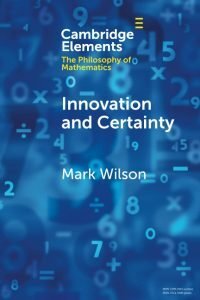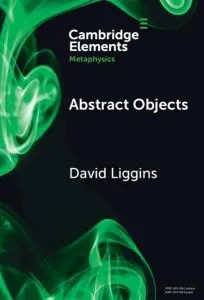More Cambridge Elements: Mark Wilson on maths, David Liggins on abstract objects
 I overlooked Mark Wilson’s Innovation and Certainty when it was published in 2020. But I didn’t miss much. The topic is an excellent one — just what is going on when we make innovations like adding points and lines at infinity in geometry (to take a reasonably comfortable but still instructive example), and just how are these extensions justified? How can we be sure they don’t lead us astray? But heavens, Wilson’s discussion is arm-wavingly pretentious and tediously obscurantist. It is just a dreadful piece of writing, and it baffles me that the series editor let it pass. Don’t waste time on this.
I overlooked Mark Wilson’s Innovation and Certainty when it was published in 2020. But I didn’t miss much. The topic is an excellent one — just what is going on when we make innovations like adding points and lines at infinity in geometry (to take a reasonably comfortable but still instructive example), and just how are these extensions justified? How can we be sure they don’t lead us astray? But heavens, Wilson’s discussion is arm-wavingly pretentious and tediously obscurantist. It is just a dreadful piece of writing, and it baffles me that the series editor let it pass. Don’t waste time on this.
 By contrast, David Liggins’s brand new mini-book on Abstract Objects is the very model for how Elements should surely be. It is admirably lucid and plain-speaking, approachable by an undergraduate student, yet the way Liggins organizes the material (evidently reflecting a good deal of thought) ought to be useful too for readers with rather more background who, for example, want to revisit the area and perhaps return to thinking about it.
By contrast, David Liggins’s brand new mini-book on Abstract Objects is the very model for how Elements should surely be. It is admirably lucid and plain-speaking, approachable by an undergraduate student, yet the way Liggins organizes the material (evidently reflecting a good deal of thought) ought to be useful too for readers with rather more background who, for example, want to revisit the area and perhaps return to thinking about it.
I do have quibbles. Well, more than quibbles. I suspect that we have pretty different views on Hale/Wright abstractionism (which is touched on), and on the value of the ideas in e.g. Charles Parsons’s Mathematical Thought and Its Objects or Øystein Linnebo’s Thin Objects, (neither of which is mentioned). And if I weren’t telling myself that I must concentrate on other projects, I’d certainly be moved to engage properly here. But disagreement is only to be expected with a fifty-page essay. And I’d still happily put this into the hands of a student. Wilson’s effort, not so much.
(Abstract Objects is still free to download from CUP for another 48 hours or so.)
The post More Cambridge Elements: Mark Wilson on maths, David Liggins on abstract objects appeared first on Logic Matters.



